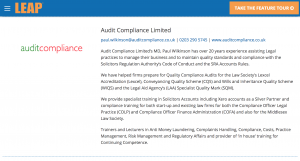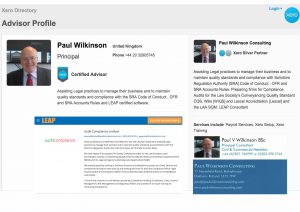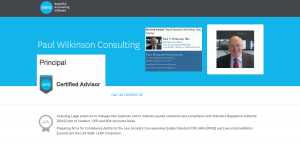I think that it is fair to say that many conveyancers have been shocked by the decision in Dreamvar (UK) Ltd v Mishcon de Reya (see Today’s Conveyancer January 30th 2017). But it is consistent with previous court decisions and follows basic principles. The buyer’s solicitors were held liable to a buyer client for breach of trust in paying the purchase price over to solicitors acting for a seller who was not the owner of the property but a fraudster.
But it is not new law to hold that a buyer’s conveyancer holds the purchase money on trust; it is not the conveyancer’s money after all. It is not new law to say that the terms of that trust are that it can only be used for the purchase of the property; why else was it given to the conveyancers other than to fund the purchase? It is not new law to hold that if a trustee uses trust funds for an unauthorised purpose, that trustee is liable for the loss irrespective of fault.
But there is protection; the Trustee Act 1925, section 61, states: If it appears to the court that a trustee, … is or may be personally liable for any breach of trust, … but has acted honestly and reasonably, and ought fairly to be excused for the breach of trust …, then the court may relieve him either wholly or partly from personal liability for the same.
Note the three conditions for relief. Yes, the trustee must have acted honestly and reasonably, but that is not enough; it is also necessary to show that he/she ‘ought fairly to be excused.’ That was the issue in this case.
To quote the Judge:
… it is common ground that it is insured for events such as this, and that its insurance cover is sufficient to cover in full the loss suffered, should it not be excused from liability. In terms of balancing the relative effects or consequences of the breach of trust, it is apparent that MdR (with or without insurance) is far better able to meet or absorb it than Dreamvar. While, as I have held, it was not unreasonable for MdR not to have advised Dreamvar about the risk of fraud, or to have sought greater protection for Dreamvar against that risk (such as further undertakings), it is also not irrelevant that MdR was necessarily far better placed to consider, and as far as possible achieve (a matter not in the event tested), greater protection for Dreamvar against the risk which in fact occurred…..
For these reasons, I conclude that MdR ought not fairly to be excused for the breach of trust
This has been the most controversial aspect of the case – the conveyancer is insured, therefore they should carry the can.
But the question has to be asked, who should fairly bear the loss? How would YOU have decided that very difficult question? In most cases there are four innocent parties: the real owner of the property; the seller’s conveyancers; the buyer’s conveyancers; the buyer himself/herself (and sometimes the buyer’s lender as well). Which of these innocents should carry the loss?
Do we wish to accept the view that it should be the buyer personally who accepts the risk? If not the buyer, it either has to be the buyer’s or the seller’s conveyancers. But in the case, all claims against the seller’s solicitors failed.
Note that the judge held that it was not unreasonable for Mishcon’s not to ask for confirmation from the seller’s solicitors as to the identity of their client but should we all, when acting for a buyer, start asking for confirmation that the person purporting to sell a property really is the seller?
But if you were so asked, what would your reply be? If you do so certify then you will be the one that foots the bill if it all goes wrong. And of course, we all act for both buyers and sellers anyway.
Insurance against fraud is also available to buyers. One international title insurer has told me that they could sell an insurance policy to protect a buyer against fraud for about £100 plus tax. Not a lot for a client to pay for freedom from worry – but we all know clients are reluctant to buy any kind of policy. But we could we limit our retainer to disclaim liability for fraud to encourage use of the policy. But unless recommended by the Law Society and the Council for Licensed Conveyancers, it would be commercially difficult.
But unless we start using dedicated policies like this it seems likely that either seller or buyer’s conveyancers will continue to bear the risk of fraud.
As to which, I can do no better than set out the view of another judge. In Patel v Freddy’s Limited [2017] EWHC 73 (Ch ) Tribunal Judge Elizabeth Cooke, sitting as a Deputy High Court Judge set out her view of the position with regard to fraudsters. Her view was:
… it is the task of the vendor’s solicitor in a conveyancing transaction to check the identity of his or her client, establishing not only that the vendor’s name is what the vendor says it is but also that the vendor really is the owner of the property. So it was for Mr Cuthbert first to carry out the “Know Your Client” procedure required by the money-laundering legislation; hence the obtaining of the passport and a utility bill to ascertain that this client really was an Ashok Patel who lived in Barnet. But it was also for Mr Cuthbert to ascertain that this was the Ashok Patel who was the registered proprietor of Sai Villa. …The important point is that this is the vendor’s solicitor’s duty, because he is the one with access to the client and to his client’s documents… but it is not for the purchaser’s solicitor to duplicate the actual checking of the vendor’s identity, nor to check that the vendor’s solicitor has done so.
In the writer’s opinion, there is much force in such views. Note that both judges state that there is no obligation on a buyer’s conveyancer to check that the seller’s conveyancer has carried out such steps.
But we are badly in need of advice from the Law Society with regard to all of this. Time to stand up Law Society and say something.





